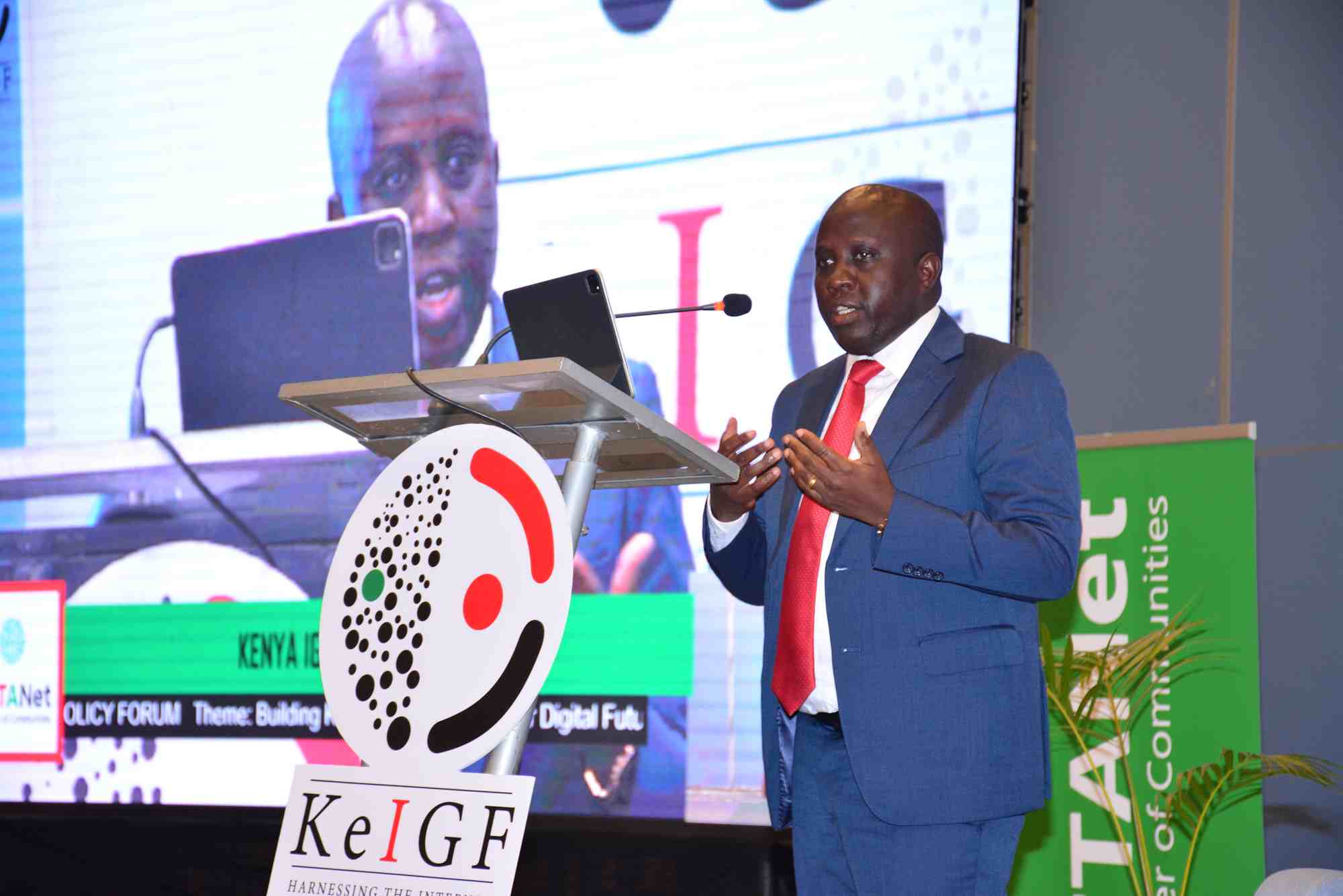By Egline Samoei
On 1st August 2024, KICTANet held the 17th edition of the Kenya Internet Governance Forum (KeIGF), held at the Edge Convention Centre in Nairobi, under the theme “Building Kenya’s Multi-Stakeholder Digital Future.” The forum brought together key stakeholders to discuss the opportunities and challenges of Kenya’s digital landscape.
Eng. John Tanui, MBS, Principal Secretary for ICT and the Digital Economy, delivered a keynote address that outlined the nation’s progress, emphasized the importance of a collaborative approach, and laid out a strategic vision for Kenya’s digital future.
His speech underscored the critical role of inclusive governance, robust infrastructure, and digital literacy in ensuring that every Kenyan can benefit from the digital revolution.
Here are key highlights of his speech at the Kenya IGF 2024 forum:
Digital Superhighway Programme: Expanding Connectivity
At the heart of Kenya’s digital transformation is the ambitious Digital Superhighway Programme, a 100,000 km fibre infrastructure project designed to provide the critical backbone for the country’s ICT sector.
According to PS Eng. Tanui, the program has already reached 20% of its target, laying the groundwork for nationwide internet connectivity. He said the government aims to connect 8.5 million homes and enterprises to the Internet through collaborations with Internet service providers.
This effort will make access to e-government services and online resources a right for every citizen, regardless of their geographical location, income level, or demographic background.
This infrastructure development is not merely about connectivity; it’s about empowerment. He said the establishment of digital hubs in Kenya’s wards will enable communities to access essential services, educational resources, and economic opportunities, fostering a foundation for sustainable development.
PS, Eng Tanui also pointed out that the continued investment in robust internet connectivity and emerging technologies like Artificial Intelligence (AI) and the Internet of Things (IoT) promises even greater contributions to Kenya’s economic future.
Kenya’s Multi-Stakeholder Blueprint for a Digital Nation
Eng. Tanui emphasized that a single voice cannot capture the complexity of the digital landscape. He said that building Kenya’s digital future requires input from a wide range of stakeholders; the private sector drives innovation, technical experts ensure a secure and efficient infrastructure, and the voices of ordinary Kenyans, online entrepreneurs, digital workers, and students must be heard and valued.
He applauded Kenya Internet Governance Forum as one of the multistakeholder approaches towards building a digital future and the Internet we Want noting that Kenya’s commitment to a multi-stakeholder approach in Internet governance ensures that diverse perspectives shape policies promoting a robust and sustainable Internet ecosystem.
This collaborative effort is essential for creating a digital environment where no one is left behind.
Digital Literacy and ICT Skills Development: Preparing for the Future
He also mentioned that ICT programs such as the Digital Literacy Programme (Jitume and Ajira) have already equipped millions of students with essential digital skills. Through partnerships with industry leaders, advanced ICT training has empowered the workforce, enabling them to thrive in a digital economy.
Eng Tanui said these efforts are not just about education but are about economic empowerment and equipping Kenyans with the skills needed to navigate the digital world.
Legal Frameworks for Digital Governance: Protecting Rights and Privacy
The PS also noted that the government has established several legal frameworks to address the challenges of the digital sector, including the Kenya Information and Communications Act (KICA), the Data Protection Act, 2019, and the Computer Misuse and Cybercrimes Act, of 2018. These laws are crucial for regulating the digital environment, protecting users’ rights, and ensuring data privacy and cybersecurity.
Eng. Tanui stressed the importance of continuously reviewing and updating these legal frameworks to keep pace with the ever-evolving digital landscape. He said by doing so, Kenya can ensure that its digital infrastructure remains secure, resilient, and aligned with global standards.
Challenges and Opportunities in Navigating the Digital Frontier
While Kenya has made significant strides in Internet governance, we still face some challenges. The spread of misinformation and disinformation, ethical considerations surrounding Artificial Intelligence, and the persistent digital divide are just a few of the issues that require ongoing attention. Cybersecurity threats loom large, and the need for constant adaptation and upskilling is more pressing than ever.
However, Eng. Tanui sees these challenges as opportunities. He said that by working together, stakeholders can build a robust cybersecurity infrastructure, bridge the digital divide through affordable internet access initiatives, and create an environment that encourages innovation and entrepreneurship.
Commitment to Human Rights and Digital Inclusion
As Kenya advances into the digital age, the government remains committed to fostering innovation while mitigating risks. Eng. Tanui highlighted the importance of protecting the rights of every Kenyan in the digital space, ensuring that the benefits of a digital economy are shared equitably. The government’s focus on advancing human rights and inclusion in the digital age underscores its dedication to creating a secure and resilient digital economy that benefits all Kenyans.
The Way Forward
The vision for Kenya’s digital future is clear: it requires action on multiple fronts. Open dialogue, inclusive policy development, investment in infrastructure, and a focus on digital literacy are essential components of this vision. Eng. Tanui called on all stakeholders including the government, private sector, civil society, and citizens to actively participate in building a digital future that is secure, inclusive, and a source of our national pride.
Egline Samoei is a CIM-certified digital marketer with 9+ years of experience as a trainer, strategist and consultant.
![]()




